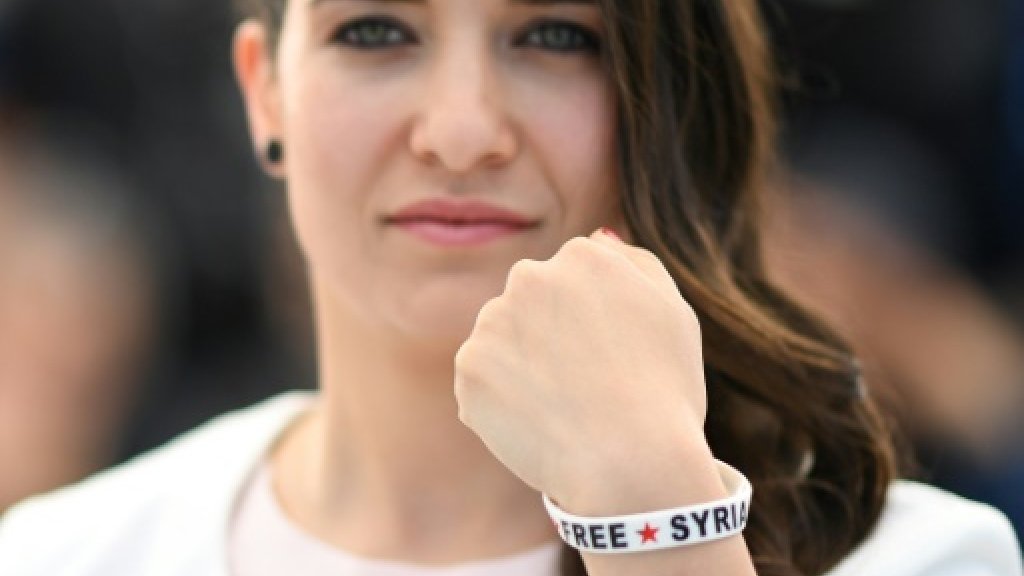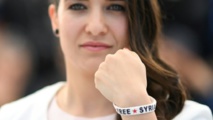audience at the Cannes film festival to tears and brought the house to its feet in a minutes-long standing ovation.
Kateab was just 20 when the pro-democracy protests began in Syria, prompting a bloody crackdown by President Bashar al-Assad that has killed 370,000 people and displaced millions.
The northern city of Aleppo suffering some of the heaviest fighting after rebels seized its eastern sector in 2012.
Her idea was to document their increasingly precarious lives in the city as the crushing might of the Russian-backed Syrian military pressed in, with the footage juxtaposing the joy of falling in love and the excitement of becoming a mother with the daily trauma of life inside the ravaged city's last hospital.
At one point in July 2016, when the situation was already very extreme, Kateab and her doctor husband Hamza went to Turkey to see his sick father. While there, they heard regime forces were poised to totally cut off eastern Aleppo.
"We knew we had to go back," Kateab told AFP. Within an hour, they had packed, despite pleas from his parents not to go, or to leave baby Sama behind.
- Not brave, just human -
With access to Aleppo almost impossible, the young family somehow made the treacherous journey, sneaking past government troops in the dead of night to reach the "safety" of the rebel-held east of the city.
At one point, baby Sama starts wailing, prompting frantic hushed efforts to calm her in a surreal scene in which they sing her a nursery rhyme about chicks and a mother hen.
"We were very scared because we didn't know where the regime soldiers were exactly. We knew it was very risky, there was shelling on the front line so they were just about to take the road," Kateab said.
What dragged them back was the close bonds they had built with those living under bombardment, and the sense they had a crucial role to play.
"We lived with these people for five years, we shared all these experiences with them, the shelling the bombings. Hamza knew how much of a difference a doctor would make in that situation, and I knew how important it was to document things," she said.
"We are not brave, we are just people. Any normal human being would do the same thing."
- 'I need you to understand' -
As the film plays out, the lives of real people are brought sharply into focus, the absurdity of laughter as missiles crash down overhead, the children painting a bombed-out bus, the snowball fights, the aching grief of two little boys over the body of their brother.
Their life increasingly revolves around the hospital where Hamza and his team race to treat the flood of victims which at one point reaches 300 a day, and which is then itself hit in an air strike.
Central to the story is her struggle with the impossible question of whether or not to flee the city to protect her daughter.
"Sama, I've made this film for you. I need you to understand what we were fighting for," she says in the voiceover.
Co-director Edward Watts said it was crucial to counter the regime's propaganda -- that they were fighting Islamic State terrorists in Aleppo.
"ISIS was only in Aleppo for three months," he told AFP.
"Ultimately, you had secular, middle-class, educated people peacefully protesting for their basic human rights and they were met with the full violence of a national military force," he said.
"The big point of the film is the shared humanity. What Waad captured is people that you know, your friends from uni, your neighbours, your school teacher."
- Traumatised but grateful -
Six months after the family returned, Aleppo was overrun and they were forced into exile.
She was later award an Emmy for her reports for Britain's Channel 4, believed to be the most watched reports of any during the Syrian civil war.
"Each one has his own difficulties, nightmares or other things, and even if I lived with this all my life, I still feel gratitude for the experiences I had," she told AFP.
"When I showed the film to the people who were there, all of them said 'This is our story'," she said.
The northern city of Aleppo suffering some of the heaviest fighting after rebels seized its eastern sector in 2012.
Her idea was to document their increasingly precarious lives in the city as the crushing might of the Russian-backed Syrian military pressed in, with the footage juxtaposing the joy of falling in love and the excitement of becoming a mother with the daily trauma of life inside the ravaged city's last hospital.
At one point in July 2016, when the situation was already very extreme, Kateab and her doctor husband Hamza went to Turkey to see his sick father. While there, they heard regime forces were poised to totally cut off eastern Aleppo.
"We knew we had to go back," Kateab told AFP. Within an hour, they had packed, despite pleas from his parents not to go, or to leave baby Sama behind.
- Not brave, just human -
With access to Aleppo almost impossible, the young family somehow made the treacherous journey, sneaking past government troops in the dead of night to reach the "safety" of the rebel-held east of the city.
At one point, baby Sama starts wailing, prompting frantic hushed efforts to calm her in a surreal scene in which they sing her a nursery rhyme about chicks and a mother hen.
"We were very scared because we didn't know where the regime soldiers were exactly. We knew it was very risky, there was shelling on the front line so they were just about to take the road," Kateab said.
What dragged them back was the close bonds they had built with those living under bombardment, and the sense they had a crucial role to play.
"We lived with these people for five years, we shared all these experiences with them, the shelling the bombings. Hamza knew how much of a difference a doctor would make in that situation, and I knew how important it was to document things," she said.
"We are not brave, we are just people. Any normal human being would do the same thing."
- 'I need you to understand' -
As the film plays out, the lives of real people are brought sharply into focus, the absurdity of laughter as missiles crash down overhead, the children painting a bombed-out bus, the snowball fights, the aching grief of two little boys over the body of their brother.
Their life increasingly revolves around the hospital where Hamza and his team race to treat the flood of victims which at one point reaches 300 a day, and which is then itself hit in an air strike.
Central to the story is her struggle with the impossible question of whether or not to flee the city to protect her daughter.
"Sama, I've made this film for you. I need you to understand what we were fighting for," she says in the voiceover.
Co-director Edward Watts said it was crucial to counter the regime's propaganda -- that they were fighting Islamic State terrorists in Aleppo.
"ISIS was only in Aleppo for three months," he told AFP.
"Ultimately, you had secular, middle-class, educated people peacefully protesting for their basic human rights and they were met with the full violence of a national military force," he said.
"The big point of the film is the shared humanity. What Waad captured is people that you know, your friends from uni, your neighbours, your school teacher."
- Traumatised but grateful -
Six months after the family returned, Aleppo was overrun and they were forced into exile.
She was later award an Emmy for her reports for Britain's Channel 4, believed to be the most watched reports of any during the Syrian civil war.
"Each one has his own difficulties, nightmares or other things, and even if I lived with this all my life, I still feel gratitude for the experiences I had," she told AFP.
"When I showed the film to the people who were there, all of them said 'This is our story'," she said.









 Home
Home Politics
Politics











